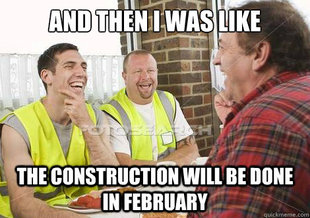 I was really inspired by Peter M Ball's blog on Stephen King's On Writing, and how it can be dangerous advice for new writers. I totally agree with Peter – there's a sense of martyrdom in the advice handed out to new writers, and a bullying attitude that executing desire to be a writer comes in only one flavour – which is to write every day. Woe betide you if you don't.
I was really inspired by Peter M Ball's blog on Stephen King's On Writing, and how it can be dangerous advice for new writers. I totally agree with Peter – there's a sense of martyrdom in the advice handed out to new writers, and a bullying attitude that executing desire to be a writer comes in only one flavour – which is to write every day. Woe betide you if you don't.
I don't believe in this, and I never have. Of course, we can all see where it comes from – it's a blanket antidote for the problem of being a writer who never writes (or perhaps finishes) anything. But as Peter points out, most of us have got jobs, families, or other commitments as worthy as our writing desire. And a rigid mantra, like a fad diet or an unrealistic gym regime, will be rapidly undone by competing obligations. And let's face it, writing every day doesn't mean you'll finish anything, either. So, is there a middle ground?
I've never written every day, and, like Peter, the times I've tried have been purgatory. In fact, I find it really useless to think "I must write 2000 words a day" – which words on what story? with what goal in mind? when will it be done? how will I know when it's done? So I want to offer a different way of thinking about writing that borrows from my engineering background.
Engineering work is often project-based – a well-defined "deliverable" by a certain date: a tunnel, a bridge, a rocket. And since, to my mind, a piece of writing (a novel, story, blog, whatever) is a fairly clearly defined outcome, project-based is how I approach stories, too. It wouldn't be particularly helpful if a construction site's management policy was We'll build stuff every day (jokes aside, many an engineered project is effectively managed to deliver on time or early).
So, rather than I must write every day, I would rather say: "I want to complete this project (whatever that is) by this date." It's about thinking of writing in blocks: as something tangible that will be completed at some future time. This then leads to critical questions:
1. What is the deliverable? (or, what needs to be done) How many words? What quality (final or just a draft)? In what form (novella, short story, novel)? How will you know when you're done? (not a silly question!).
2. Is the timeline reasonable? (or, how will it be done) Can I achieve the goal, knowing what I know about my other commitments and how I've worked in the past? (be really honest!) This allows you the flexibility to work out realistic, commitment-friendly goals. This might be weekly targets, a bingo card, or whatever technique works for you.
3. How will I build in contingency? Things change. Aim to deliver on time, but be prepared if things run over. Look at your past experience for guidance.
All my novels and many of my short stories have been produced this way. This makes my writing an episodic activity – I have periods of intense writing shooting for a goal (weeks or months), followed by stints with almost no writing, where I'm working other jobs, editing, taking breaks, etc. This suits me because of how I relate to my projects – I need to have some mental idea of the whole project's length, and how I'm going to get there – and the nature of my work. I also learn a lot about how quickly I can work if I need to, which informs the next project.
Now, I hasten to add that I don't do everything this way; that would be painful and unncessary. But the things I really really want (or need) to get done must be managed. And the point of this isn't to feel bad about what you can and can't do; it's about working out how you, in your particular circumstances, can make writing (and finishing) work.
This may not work for you, but take heart if you can't write every day. Be encouraged to try other things. Daily writing is not some panacea that separates the worthy from the rest. Finishing work should be the goal, and in a timeframe that suits the part writing plays in your life.
